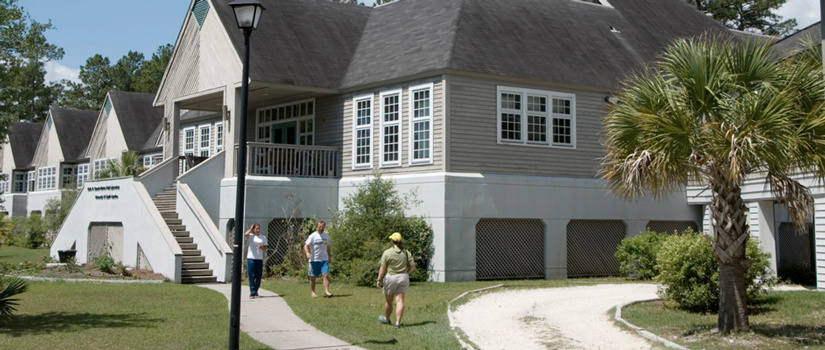Every year, more than 100 scientists from the University of South Carolina and more than 20 other universities and agencies work in the Marine Field Laboratory. The marsh-side Marine Field Laboratory complex consists of a large building for research and education activities, two seawater buildings, outdoor mesocosms, boardwalks and piers, a maintenance shop, boat sheds, and the Kimbel Living and Learning Center.
Main Laboratory Building
The main laboratory building (21,645 sq ft) includes research laboratories, computer center, a seminar room, a conference-dining room, an archive sample room, a classroom, site library, teaching lab, walk-in refrigerators and freezers, large screened work areas as well as technical and administrative support offices.
Amenities include:
- Tapped seawater in the research laboratories
- Internet and a video teleconferencing system
- Analytical equipment, including inorganic and carbon analyzers, spectrophometers, high quality light microscopes, and a scintillation counter
- Ground-based LIDAR, infrared and multispectral cameras, kite-balloon, or other field-based equipment
A wing of the main building houses the North Inlet-Winyah Bay National Estuarine Research Reserve which provides an additional classrooms, teaching laboratories, computer labs, and offices in support of educational programming and research.
Seawater Buildings
The seawater buildings (3,078 sq ft) are equipped for field-oriented research requiring a large volume of tapped seawater and analytical equipment. The seawater system provides up to 500 gpm of natural tidal creek water and 50 gpm of 50 micron filtered water.
Other Facilities
For manipulative experimental research in intertidal habitats, large replicated mesocosms are available.
The maintenance shop provides vehicle and boat support and offers services to assist in research projects.
Access to the local coastal habitats is via piers, floating docks, boat ramps. A marsh boardwalk and a laboratory observation deck provide additional access.
Resources and Services
Resources include a laboratory space, boats, vehicles, lodging, field equipment, expendable supplies, and voucher specimens. In addition, staff assistance, boat training certification, habitat expertise, data and water chemistry lab services, and guided field experiences may be arranged. See the Plan a Visit for information on reservations and any applicable charges.
